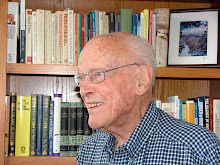The Grand Canyon, Evolution, and Intelligent Design is the most logical, readable, and convincing treatment of this tangle of issues that I in my long life have read. I can only hope that your irenic, scientifically praiseworthy discussion will serve to correct the many unbalanced arguments put forth by both biblical and anti-theistic authors. I will recommend your work whenever I have opportunity to do so.
Vernon C. Grounds, Chancellor, Denver Seminary
Sunday, June 15, 2008
Wednesday, December 26, 2007
Preliminary Response
I am pleased with the enthusiastic reception given this book by those who so far have read it. I hope that my next book, a commentary on Paul's Letter to the Ephesians, for which I am currently seeking a publisher, will be equally well received.
Monday, December 24, 2007
Recently published book on intelligent design
The Grand Canyon, Evolution, and Intelligent Design briefly describes five primary ways Christian thinkers have sought to reconcile scientific evidences for an old earth and Biblical creation accounts: young earth creationism (flood geology), reconstruction creationism, progressive creationism, providential creationism, and macrotheistic creationism. The last is a new word that I've coined for a somewhat similar group of theories that view God as an initial creator of the universe and commonly life, but see him as absent or only remotely involved with the direction of creation, allowing physical laws and chance to bring creation about. These are contrasted with a brief description of naturalistic evolution, which holds that all the varied forms of life evolved through Darwinian natural selection, which sees evolution as a process without goals and directed by nothing but random forces.
The book then examines the creation passages of Scripture and determines that none have anything to say regarding the time of God's creative work or the methods he used in creation. Hence someone who takes a young earth view is not transgressing any Biblical boundaries, and neither is someone who believes that through a gradual process God brought the myriads of life forms into being over several hundred million years.
The author asks, "Where then can we turn to discover God's timing and method of creation?" The answer is, in the other book God has written. Just as the Bible has come from the hand of God, so has the created world. By examining the history God left in the rocks, the basic outlines of his methods have been revealed. The book shows the bankruptcy of young earth scientific claims and the reasonableness of what the sciences of biology and geology have discovered.
Nevertheless, the author strongly rejects the presumably scientific conclusion that because things appear to occur according to random patterns, God is not present and has had no hand in the process. To draw such a conclusion is to make a metaphysical judgment. The Christian who takes the Bible as the Word of God also draws a metaphysical conclusion, but his or her conclusion rests on far more solid grounds.
The book explains these issues in some detail. If you read the book carefully, the author welcomes both your comments and criticisms.
The book then examines the creation passages of Scripture and determines that none have anything to say regarding the time of God's creative work or the methods he used in creation. Hence someone who takes a young earth view is not transgressing any Biblical boundaries, and neither is someone who believes that through a gradual process God brought the myriads of life forms into being over several hundred million years.
The author asks, "Where then can we turn to discover God's timing and method of creation?" The answer is, in the other book God has written. Just as the Bible has come from the hand of God, so has the created world. By examining the history God left in the rocks, the basic outlines of his methods have been revealed. The book shows the bankruptcy of young earth scientific claims and the reasonableness of what the sciences of biology and geology have discovered.
Nevertheless, the author strongly rejects the presumably scientific conclusion that because things appear to occur according to random patterns, God is not present and has had no hand in the process. To draw such a conclusion is to make a metaphysical judgment. The Christian who takes the Bible as the Word of God also draws a metaphysical conclusion, but his or her conclusion rests on far more solid grounds.
The book explains these issues in some detail. If you read the book carefully, the author welcomes both your comments and criticisms.
Subscribe to:
Posts (Atom)
